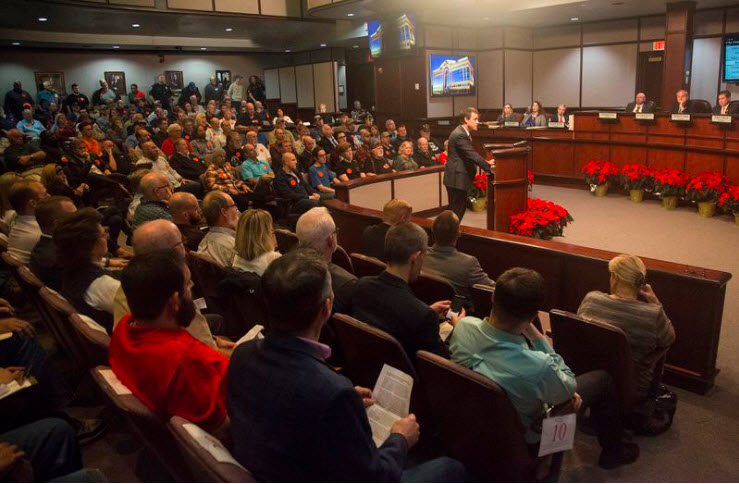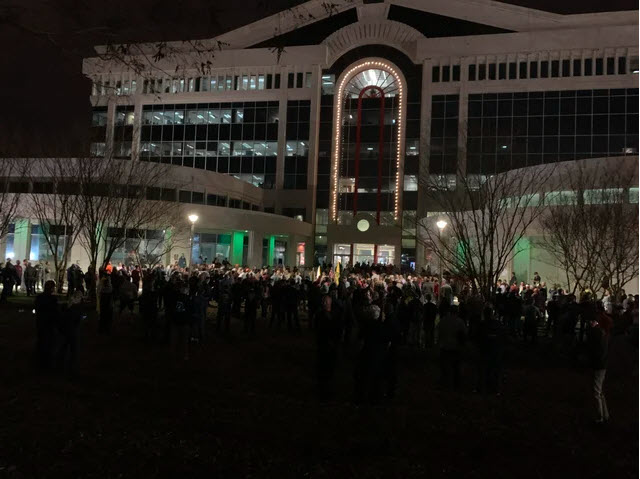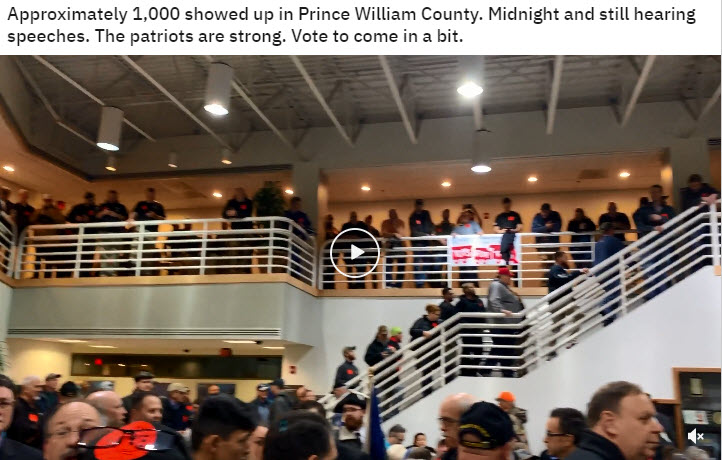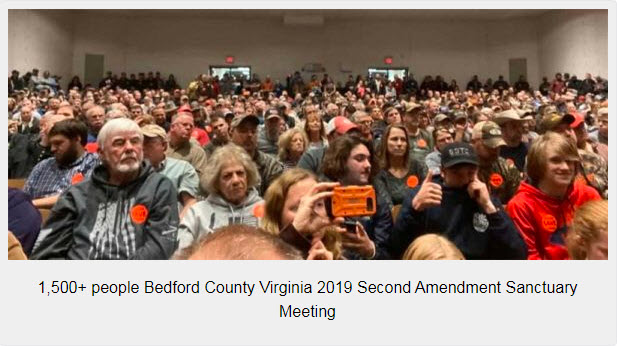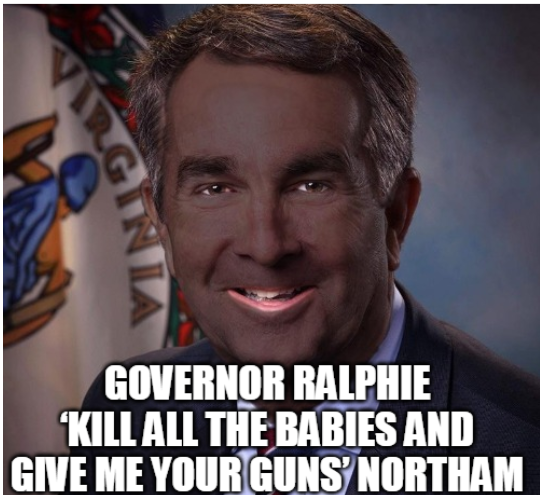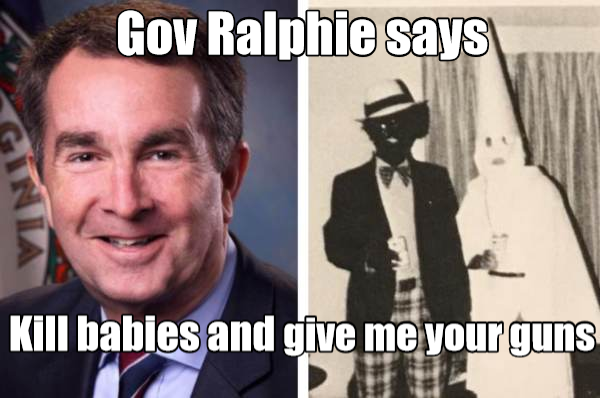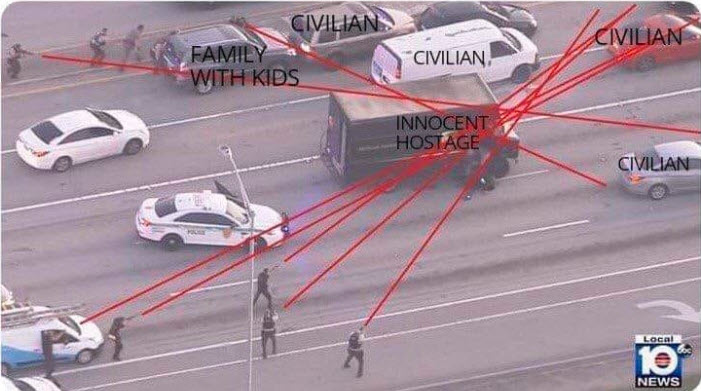Via Virginia reporter Mack, this bit of interesting analysis.
But do these resolutions have any teeth?
The short answer is: Not really. If local officials refuse to enforce the new state laws, they themselves would be breaking the law. Since most wouldn’t do that, the measure is really just symbolic.
[ … ]
The term “sanctuary cities” might remind some of similar efforts taken on the issue of immigration enforcement — cities that said they would not do the government’s bidding when it came to pursuing undocumented immigrants.
But there are key differences between those and the current situation, said Richard Schragger, a law professor at the University of Virginia. States and localities have the option to cooperate with federal immigration laws because the Constitution limits the ways the feds can force locals to enforce federal law.
But if a local official refuses to follow state law, that becomes more of a problem, he said.
Police officers do have discretion when it comes to certain laws. Little could be done legally, for example, in a situation where a cop pulls someone over and finds they have a gun they’re not allowed to have and decides not to do anything about it.
But local officials then open themselves up to contempt charges and police officers to individual liability, Schragger said. Say the officer doesn’t confiscate a gun that’s supposed to be under a new law, and then someone gets killed with the same weapon. The officer could become liable.
This is all a pregnant bit of prose and requires some unpacking. Richard Schragger, a law professor at the University of Virginia, has misled the reporter and the readers. It’s all quite a bit more complicated than that, and he knows it.
His analysis is similar in import to the one today by a member of the Virginia legislature, David Toscano, written at Slate.
Conservatives have railed for years against so-called sanctuary jurisdictions, criticizing localities that refuse to cooperate with federal immigration policies they deem heartless and ineffective. In the past year, however, some conservative lawmakers have taken a page from the progressive playbook, employing sanctuary imagery in opposition to gun safety legislation they deem to be an unconstitutional restriction of their rights under the Second Amendment.
The two approaches are classic cases of false equivalency. Jurisdictions that proclaim themselves sanctuaries for immigrants do not seek to violate the law; they simply refuse to engage local law enforcement in supporting actions that are federal responsibilities. They do not block the law, but simply insist that it should be enforced by those who have the responsibility to do so. For some proponents of so-called gun sanctuaries, however, the goal is to prevent enforcement of state law that the jurisdiction (not a court) deems unconstitutional.
Oh. Is that the way it works? Well then. I guess Reuters is wrong to point out that “Sanctuary cities are those where local officials decline to hand over illegal immigrants for deportation.” Yes, in fact, that’s exactly what an illegal alien sanctuary city is.
Professor Schragger, a little digging shows, absolutely hates preemption (this link also works). You see, he wants cities and towns to be able to levy taxes, impose regulations and do all sorts of things not granted authority by the state. He calls preemption an “an attack on American cities.” As long as the tilt is towards more and more regulation, he’s okay with it all. If cities seek to ignore state law, he’s not.
So by attempting to pose a quick defeater argument for the equivalence between illegal alien sanctuary cities and 2A cities and counties, both authors have introduced more problems to deal with. The most significant illegal alien sanctuary city case Trump has won merely allowed the FedGov to “give preferential treatment in awarding community policing grants to cities that cooperate with immigration authorities.” That’s it. That’s the sum total of the judicial victory.
So what Toscano and Schragger have done is pose a defeater, and hope that you didn’t dig to find the details enough to see that their argument fails, and does so miserably. Their attempt at defeating the “false equivalence” ends up showing the similarity, and yet they still dislike state attempts at preemption on illegal alien sanctuaries, and like it for 2A sanctuaries.
They’ve done nothing more than restate their own axiomatic irreducibles, or presuppositions. They both bias towards so-called progressive views, while denying the right of others to invoke those same tools for their own uses. But the law is the result of these philosophic pre-commitments, not the source of them. Philosophic pre-commitments come first, not last. The law comes last, not first.
We do the very same thing, recognizing that our own pre-commitments are not theirs. The fundamental divide has nothing to do with the law, per se. It has to do with the polarization of America, which not just continues unabated, but is accelerating. We dislike preemption when it comes to preservation of our 2A rights, and like it when it comes to illegal alien sanctuary cities. These views have to do with preservation of certain God-given rights, tendency in the Latino voters to undermine those rights, and other issues too involved to fisk at the moment.
Again, philosophic pre-commitments govern the outcome of the debate, not the law, the law being the result of the debate. That’s why judge-shopping is so in vogue with the progressives. Philosophic pre-commitments can change your view of everything, not least of which is how mankind should be governed.
But that doesn’t end the issues with the analysis above. Professor Schragger has oversimplified the issue when he discusses failing to remove weapons from a citizen and that weapon being used in a crime, leading to culpability and liability by the LEO. Does the professor think that LEOs are going to log in weapons owners, along with the respective serial numbers of all firearms, make permanent records searchable by NICS or some other means (i.e., a registry), and make them available for future use by law enforcement? Form 4473 isn’t a registration, and firearms can be sold to others in person-to-person transfers. Having your information on Form 4473 proves nothing concerning present ownership of a firearm. What tool does professor Schragger think will be used for this draconian scheme of culpability? He posits all sorts of wet dreams for controllers, but has no idea how this all functions in real time and space.
Piling problem on top of problem, professor Schragger knows, or at least he should know, that LEOs bear no responsibility whatsoever for the protection of the public. We’ve seen that from the doctrines established in Castle Rock versus Gonzalez and Warren versus the District of Columbia. No LEO will stand trial for failing to confiscate a weapon because of it being used later in a crime. That’s a preposterous notion, a sophomoric pretension suitable only for scare-tactics.
As to the extent of efficacy of these ordinances and resolutions, that’s an open question and both of the authors know it. Sheriffs may lose their nerve, individuals may not find support among neighbors, and militias may fall apart. My bet is against this.
Sheriffs may arrest state agents for enforcing new gun control laws. Sheriffs can be thrown out of office and new ones elected. Militias may end up forming road blocks and preventing state agents from enforcing any new laws. Firearms will be purchased across state lines and from person-to-person. Existing firearms will not go away, and most assuredly will never be registered in a state registry. The compliance rate for these kinds of laws in New York and Connecticut was virtually non-existent, and Virginia isn’t Connecticut.
What I’m certain of, however, is that state agents and politicians of Virginia have absolutely no idea what’s coming, and presume the wrong things about the people of Virginia. Pollyanna analyses like that from professor Schragger are misleading, and a much better gauge of what this will look like is knowing the people of Virginia.
In summary, 2A ordinances and resolutions have exactly as much teeth as the people of Virginia and their willingness to oppose new laws – not one ounce more, and not one ounce less, the professor and the politician notwithstanding.
